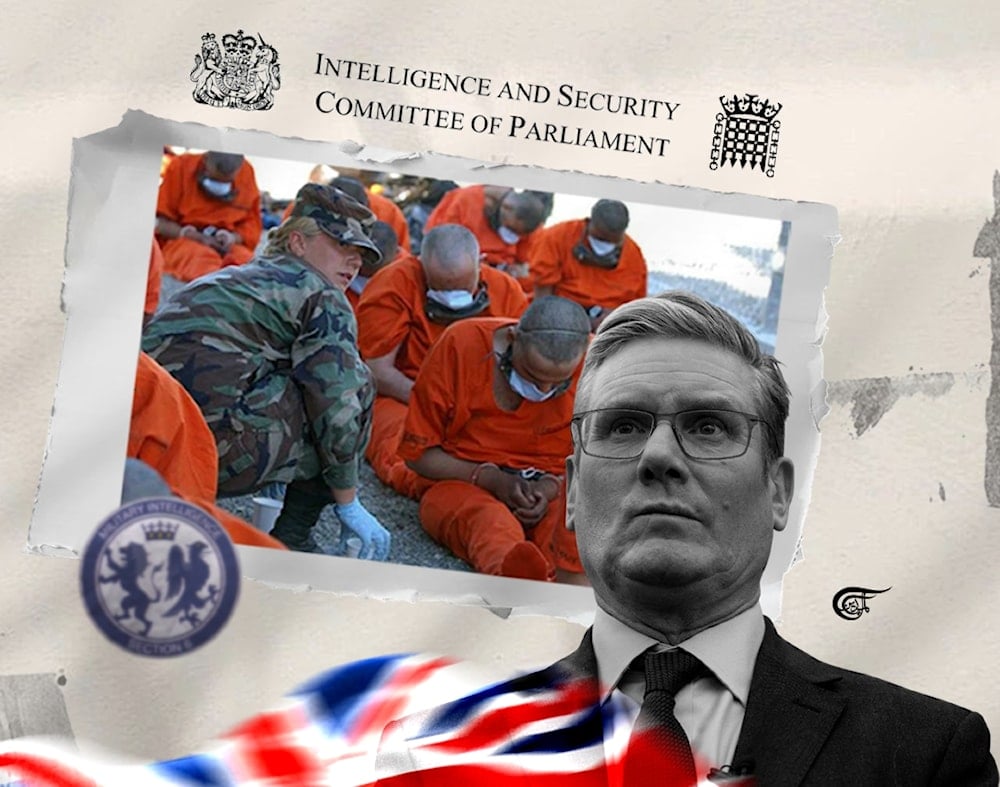British intelligence: A law unto themselves
Kit Klarenberg exposes a crisis within the UK's spy oversight committee, revealing systemic Cabinet interference, chronic underfunding, and decades of concealed complicity in torture and rendition operations.
-

Starmer’s rapid, ruthless rise to power strongly suggests he was groomed and protected by Britain’s deep state every step of the way. (Al Mayadeen English; Illustrated by Batoul Chamas)
On May 1st, The Times reported that Britain’s Intelligence and Security Committee, a parliamentary body intended to supervise and appraise the work of London’s assorted spying agencies, was facing a funding “crisis” so severe it may be forced to cease functioning outright. Moreover, in a remarkable statement, current ISC chair Lord Beamish fulminated that the Committee’s work was “being undermined by continued interference by the Cabinet Office,” the British government’s most powerful component, within which the ISC is based, but also meant to scrutinise:
“The root of the problem lies in the control exerted over the Committee’s staff and resourcing by the Cabinet Office…An oversight body should not sit within, and be beholden to, an organisation which it oversees…The UK intelligence community has grown at an extraordinary rate…There is now around £3 billion of public money being spent for which there is no oversight capability…if the committee does not receive an increase in resourcing then it will not be able to keep its doors open.”
Beamish added that this issue “goes to the very heart of parliament’s ability to hold the government to account for those actions being taken in secret, behind closed doors, funded by the public purse.” His statement noted the Conservative government of Rishi Sunak agreed to an “emergency uplift” to offset the ISC’s fatal funding shortfall prior to the July 2024 general election, but “officials [have] declined to implement it” ever since Labour’s landslide victory.
The Times was at pains to frame the ISC’s “robust criticism of the inner workings of government” as “rare”, and the Committee’s grievances as a mere “administrative matter”. In March however, Beamish voiced similarly grave anxieties about “intelligence activity” being conducted in Britain “without democratic accountability,” sounding alarm the ISC was “on the brink”, with “serious gaps which need to be addressed.” He slammed the institutional framework under which the Committee operated as “woefully out-of-date”, and Cabinet Office cuts to its already inadequate workforce:
“We don’t have enough staff to keep us operational at the moment…This is a crisis…Our headcount [has] been decimated by the Cabinet Office. We have shrunk. We are down to a skeleton staff…We are in crisis. This isn’t a bloated organisation that has been steadily growing over the last decade: this is a tiny team that was already overwhelmed and has now been cut even further.”
Concerns about whether the Committee is fit for purpose have abounded almost ever since its 1994 creation under the Intelligence Services Act - which formalised in law MI6’s “licence to kill” for the first time - and with good reason. Unlike other parliamentary select committees, the ISC shares its reports with the government and spying agencies it ostensibly evaluates in advance of publication, to ensure no details Britain’s political leaders or intelligence community want to remain secret seep into the public domain.
We must ask ourselves whether the ISC’s ever-increasing inability to keep an eye on the activities of British spying apparatus is by design, and the Committee is concertedly being primed for extinction. As domestic repression ratchets due to constantly mounting public outrage over the Gaza genocide, and London inches ever-closer to all-out hot war with Russia, from the perspective of MI5, MI6, GCHQ et al, it has never been more vital their activities remain camouflaged from public view.
‘Reasonably Suspected’
In February 2015, Conservative MP David Davis - who helped create the ISC, explicitly to break open London’s security and intelligence services to greater scrutiny and transparency - publicly warned that the Committee had been “captured by the agencies they are supposed to be overseeing.” He charged then-ISC chair Malcolm Rifkind “acted almost invariably as a spokesman for the spooks.” Davis added British spies had relayed to him privately they “have never taken the ISC seriously,” and the Committee “only know what we tell them.”
Davis cited the example of NSA whistleblower Edward Snowden’s bombshell revelations about the extent of GCHQ’s global, population-scale spying as an illustrative example. Rifkind had “time and again” justified this activity, stating it was “legal and they are acting within the law,” rather than “calling in the head of the agency and saying ‘why wasn’t I told about this?’” In 2018 and 2021, the European Court of Human Rights found GCHQ’s bulk surveillance to be completely unlawful, contrary to Rifkind’s risible contentions.
Two months prior to the ECHR’s first landmark ruling against GCHQ, the ISC published a long-awaited report on the complicity of Britain’s domestic and foreign intelligence agencies in the CIA’s global post-9/11 torture program. Its release was delayed as Washington demanded changes be made to its content, just as the US Senate’s own report on the subject was redacted to conceal London’s involvement in the criminal connivance. Perversely, the ISC ruled in February 2015 those amendments were motivated by legitimate “national security” concerns.
The introduction of the ISC report on “Detainee Mistreatment and Rendition: 2001–2010” states plainly its findings “[are] not and must not be taken to be, a definitive account,” as “the terms and conditions were such that we would be unable to conduct an authoritative inquiry and produce a credible report.” The Committee was concertedly hampered in its probe by then-Prime Minister Theresa May imposing onerous restrictions, which the ISC believed contravened the “greater powers and protection” it is supposedly afforded over standard parliamentary committees.
May’s proscriptions included denying the ISC access to any officers and personnel directly involved in torturing detainees and key witnesses, meaning only four British intelligence operatives could be interviewed in total. Moreover, those grilled weren’t allowed to comment on “the specifics of the operations in which they were involved, nor fill in any gaps in the timeline of events,” and the Committee “could not quote their evidence in its report.” Despite these crippling limitations, the ISC still unearthed multiple damning findings.
For instance, MI6 operatives directly participated in interrogations of detainees held by US authorities at locations in Afghanistan, Iraq, and Guantanamo Bay 2002 - 2004, with the Committee identifying 13 cases of British intelligence personnel witnessing detainee torture first-hand. London also shared an “unprecedented” amount of intelligence with foreign liaison agencies “to facilitate the capture of detainees”, when it was known or “reasonably suspected” these individuals would be subject to torture.
A minimum of 198 cases in which British spies received intelligence obtained from people “they knew or ought to have suspected” had been tortured were identified. There were also at least 128 incidents of British intelligence being informed by their foreign counterparts that prisoners had been mistreated. London was found to have offered financial inducements to foreign liaison agencies to conduct extraordinary rendition operations, and suggested, planned or agreed to rendition operations proposed by foreign spying services at least 28 times.
‘Insufficient Evidence’
The ISC additionally found MI5 and MI6 were directly involved in 53 rendition operations, including at least three funded by the agencies themselves. On a staggering 559 occasions, the pair attempted to extract information from detainees they knew or had good reason to suspect had been tortured. Incontrovertible evidence of London’s at-times leading role in extraordinary rendition was uncovered via a trove of documents found in abandoned Libyan government offices, following Muammar Gaddafi’s October 2011 fall.
Among the papers were faxes sent in March 2004 by then-MI6 counter-terror chief Mark Allen to Tripoli, regarding terror suspect Abdel Hakim Belhaj and his pregnant wife Fatima Boudchar. The pair were kidnapped by MI6 in Malaysia earlier that year, then transported to Libya. Belhaj went on to endure six years of abuse in Libyan government torture chambers, at British direction. All along, intelligence operatives in London provided interrogators with questions to ask the prisoners. In one missive, Allen wrote:
"I congratulate you on the safe arrival of [Belhaj]. This was the least we could do for you and for Libya to demonstrate the remarkable relationship we have built over recent years…Amusingly, we got a request from the Americans to channel requests for information from [Belhaj] through the Americans. I have no intention of doing any such thing. The intelligence about [Belhaj] was British…I feel I have the right to deal with you direct on this.”
These highly incriminating communications were a smidgen of the 28,000 pages of documentation on Allen’s extraordinary rendition role amassed by Britain’s Metropolitan Police. Yet, in 2014 the Crown Prosecution Service - then-led by Keir Starmer, now Prime Minister - inexplicably declined to charge him, on the basis of “insufficient evidence”. Even more material was collected on the activities of other high-ranking MI5 and MI6 operatives intimately embroiled in the CIA-led global torture program, but again, British prosecutors refused to move against them, at Starmer’s express direction.
Starmer’s rapid, ruthless rise to power strongly suggests he was groomed and protected by Britain’s deep state every step of the way. This interpretation is amply reinforced by the premier’s deep and cohering relationship with London’s security and intelligence services. His much-vaunted spell leading the CPS was typified by suspiciously destroyed files related to the persecution of WikiLeaks founder Julian Assange, and exoneration of notorious paedophile Jimmy Savile. The time has perhaps come for his accumulated debts to MI5 and MI6 to be cashed in.

 Kit Klarenberg
Kit Klarenberg
 9 Min Read
9 Min Read











